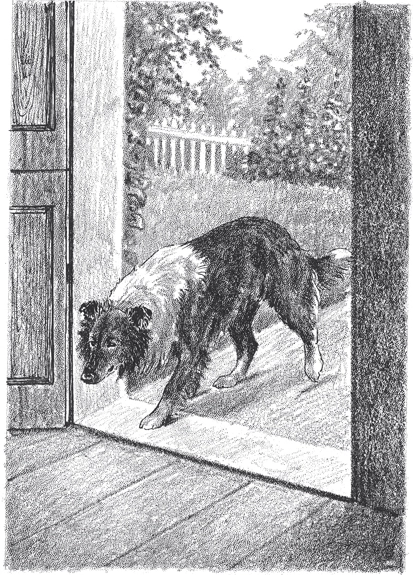For, while in school all the children spoke “pure” English, it was considered polite to answer adults in the same accents that they used.
“She were bi’ t’ schooil gate,” Joe shouted.
But after that he knew the truth. His father had not bought the dog back again, or else all the men would have known it. In a small village like Greenall Bridge everyone knew the business of everyone else. And certainly, in that particular village, they would have known about any such important matter as the resale of Lassie.
Lassie had escaped! That was it!
And so young Joe Carraclough ran gladly no more. He walked slowly, wonderingly, as he turned up the hillside street to his home. By his door he turned and spoke to the dog sadly.
“Stay at heel, Lassie,” he said.
With his brow furrowed in thought, he stood outside the door. He made his face appear blank of expression. He opened the door and walked in.
“Mother,” he said. “I’ve got a surprise.”
He held out his hand toward her, as if this gesture would help him get what he most desired.
“Lassie’s come home,” he said.
He saw his mother staring at him. His father looked up from his place by the fire. Then, as he came into the cottage, he saw their eyes turn to the dog that followed obediently at his heel. They stared but they did not speak.
As if the collie understood this silence, she paused a moment. Then she walked, going head down as a dog will when it feels that it has done something—it does not know what—that is wrong. She went to the hearth rug and wagged her tail as if in signal that no matter what sins had been committed, she was willing to make up again.
But there seemed to be no forgiveness, for the man turned his eyes from her suddenly and stared into the fire. That way the man shut his dog from his sight.
The dog slowly coiled herself and sank to the rug, so that her body touched the man’s foot. He drew it away. The dog lay her head across her paw and then, like the man, stared into the depths of the fire, as if in that golden fancy-land there would be an answer to all their troubles.
It was the woman who moved first. She put her hands on her hips and sighed a long, audible sigh—one that was eloquent of exasperation. Joe looked at her and then, to try to soften their stoniness, he began speaking, his voice bright with hope.
“I was coming out of school, and there she was. Right where she always is. Right at the gate waiting for me. And you never saw anyone as glad to see you. She wagged her tail at me. She was that glad to see me.”
Joe spoke on, the words racing from him. It was as if as long as he could keep on talking, neither his mother nor father could say the dread words that he expected to hear. With his flood of speech, he would hold back the sentence.
“I could see she was that homesick for us—for all of us. So I thought I’d bring her right along, and we could just…”

Lassie paused, then walked head down.
“No!”
It was his mother, interrupting loudly. It was the first word that either of the parents had spoken. For a second Joe stood still, and then the words flooded from him again, making a fight for what he wanted and what he dared not hope he could have.
“But she’s come home, Mother. We could hide her.
1 comment